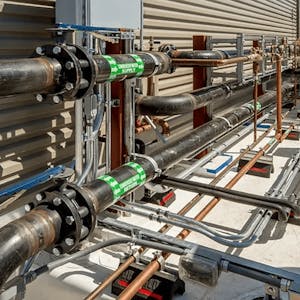This course delves deep into the intricate dynamics of single-phase fluid flow in piping systems, encompassing topics such as pipe hydraulics, pressure drop calculations, and transient analysis. It offers essential insights into predicting the optimum pipe diameter and understanding the impact of various parameters on fluid flow and pressure drop.
The comprehensive curriculum covers:
Upon completion, participants will possess the expertise required to optimize piping systems for industrial applications, ensuring efficient fluid flow and pressure management.
Certificate Available ✔
Get Started / More Info
The course includes comprehensive modules covering single-phase flow regimes, pressure drop through piping components, analysis of piping networks, and transient fluid flow and pressure phenomena.
Module 1 provides an in-depth understanding of single-phase flow regimes, hydraulic radius, Reynolds number, and pressure drop calculations in pipes. It also covers friction factor correlations and problem-solving scenarios to reinforce learning.
Module 2 explores pressure drop through various piping components, including sudden enlargements, contractions, orifices, nozzles, and valves. Participants gain insights into calculating major and minor losses in piping systems.
Module 3 delves into pressure drop calculations in piping networks, covering scenarios such as parallel and series pipes, flow rate determination, and pressure drop in header and branching pipelines. It also addresses transient analysis and water hammer phenomena.
Module 4 provides comprehensive insights into transient fluid flow analysis, water hammer, steam hammer, and gravity-driven flows. Participants learn to analyze and mitigate transient fluid flow phenomena in industrial piping systems.
Semiconductor Packaging provides a foundational understanding of packaging design, manufacturing, and future challenges in the semiconductor industry.
Learn about FEM and perform linear & nonlinear static analysis using SimScale. Gain hands-on experience in cloud-based simulation technology.
Material Jetting and Stereolithography is a comprehensive course covering two photopolymer resin-based processes. Students will gain insights into build preparation,...
This course delves into motion planning for robotic systems, covering graph-based methods, randomized planners, and artificial potential fields.